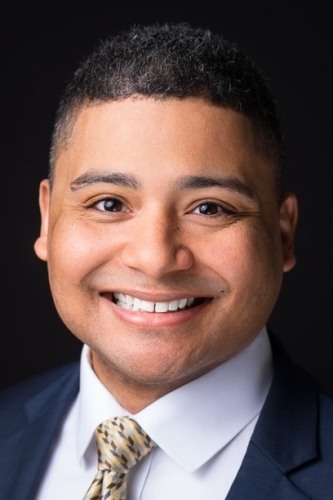
Cameron Ayala MD ’25, ScM ’25
Biography
Cam Ayala’s inspiration for medicine was very close to home. His grandfather was CEO of the now-closed Southwest Detroit Hospital, which hired Black doctors and nurses when other hospitals wouldn’t. “As a kid, I’d hear my father and grandfather talking about the struggles of the people of Detroit,” Ayala says. Though they weren’t physicians, they cared about how those struggles impacted the hospital system, and believed strongly in serving populations in need.
That love for service defined Ayala throughout his education. After a great deal of medical volunteering in high school, he arrived at the United States Military Academy West Point, where he studied international law. He served in the Army for six years before beginning medical school.
“Things done domestically can have long-reaching impacts,” Ayala says of his experience in civil service. The skills he learned as a student of law and a troop commander complement his medical work in a myriad of ways. “Discipline and leadership skills really helped me prepare for medicine,” he says. “It was a seamless transition from one service-based career to another.”
At Brown, Ayala enjoyed connecting his interests in surgical outcomes to social determinants of health. One example of such an intersection, with the mentorship of Oliver Tang ’19 MD’23, was his thesis, in which he assessed disparities in spine tumor surgical outcomes for dual-qualifying Medicare and Medicaid patients.
Experiences like this one, “off the beaten path,” shaped his time in medical school. Ayala described his time in the LIC as another extraordinary opportunity. In addition to accessing “excellent teaching and mentorship” one-on-one with attending physicians, he followed patients throughout the year.
“Several of my peers were able to follow a pregnant patient from the time of conception through delivery,” Ayala says. He worked closely with a patient he met in his family medicine clinic, even attending the man’s neurology clinical visit to learn more about his experiences with specialty care.
This thorough understanding of longitudinal care is something he shared with other students as an LIC fellow. Whether it was helping students prepare for OSCE shelf exams, or exploring the “physician-plus” concept (being a top-notch MD but considering other passions), Ayala worked hard on exploring aspects of health care outside the sphere of the hospital.
His time at the family medicine clinic of Crossroads, a housing and homeless services provider in Providence, with Clinical Assistant Professor of Family Medicine (and PC-PM alum) Matthew Perry MD’19 ScM’19 RES’22, stands out to him as deeply formative. From difficulties accessing care to having medicine stolen from them on the street, the patients Ayala met at Crossroads “broadened my horizons,” he says. “I was introduced to challenges which we take for granted, that people on the fringes of society see day-to-day.”
Ayala hopes to continue working with diverse populations, and strives to embody the “physician-plus” ideal in giving back to the community beyond his medical practice, “whether that’s teaching in academics, a trip working at a free clinic, or working in a rural, underserved area,” he says. This summer, he will return home to Florida, having matched into the University of Miami’s internal medicine residency.
Ayala encourages students never to lose sight of the patient in the room. “Take the learning seriously, because there are people’s lives at stake,” he says. “Putting in the extra effort to learn as much as possible from books and in the hospital is deeply important—but it’s just as important never to forget the humanity in the situation, that there’s a real person in front of you.”